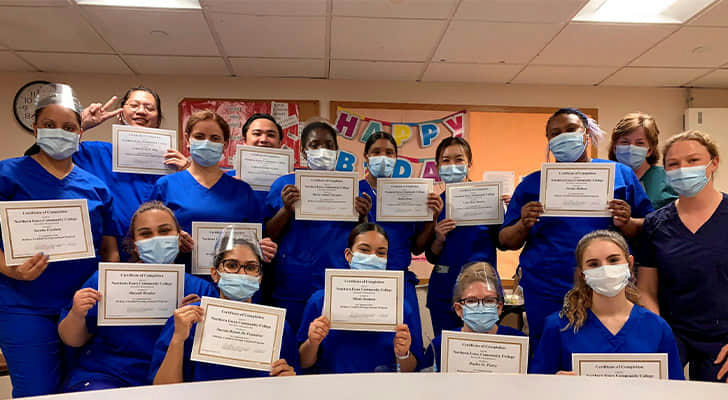Becoming a CNA is Your Best First Step in Healthcare
A Certified Nursing Assistant (CNA) is an essential part of the healthcare team, providing crucial support to patients and medical staff. CNAs help with daily activities like bathing, dressing, and feeding, ensuring patients receive the care they need. They work under the supervision of registered nurses (RNs) or licensed practical nurses (LPNs) in various settings, including hospitals, nursing homes, and rehabilitation centers.
In addition to personal care, CNAs monitor vital signs, document patient information, and maintain a safe, clean environment. Their close interactions with patients allow them to build strong relationships and communicate any changes in a patient's condition effectively.
Becoming a CNA typically involves completing a state-approved training program, that can take just a few weeks to a few months. After training, candidates must pass a certification exam to demonstrate their skills and knowledge. This role is often a stepping stone into the healthcare field, offering valuable experience for those looking to advance to nursing or other medical professions. If you're considering a career in healthcare, becoming a CNA is a rewarding way to start. Overall, the original passage is clear and informative!

How Do You Become a CNA?
Becoming a Certified Nursing Assistant (CNA) is an exciting and rewarding way to kickstart your career in healthcare! If you're ready to make a difference in people's lives, here’s how you can become a CNA in just a few simple steps.
Step 1: Understand the Basics
First, it's important to know what a CNA does. CNAs provide essential care to patients, helping them with daily activities. They also monitor vital signs and assist nurses in various healthcare settings, such as hospitals and nursing homes.
Step 2: Meet the Requirements
To start your journey, you typically need to be at least 18 years old and have a high school diploma or GED. Some programs may also require a background check and proof of immunizations. Check your state’s specific requirements to ensure you’re ready!
Step 3: Enroll in a CNA Program
Next, find a state-approved CNA training program. These programs usually last between four and twelve weeks and include both classroom instruction and hands-on clinical training. Look for programs at community colleges, vocational schools, or local healthcare facilities.
Step 4: Pass the Certification Exam
Once you complete your training, it’s time to take the CNA certification exam, which includes a written test and a skills assessment. Don’t worry if you don’t pass on your first try—you can retake the exam!
Step 5: Start Your Career
After passing the exam, you’ll receive your CNA certification and you can begin applying for jobs. CNAs are in high demand, so you’ll have plenty of opportunities in various healthcare settings. With dedication and the right training, you can become a CNA and embark on a fulfilling healthcare career. Are you ready to take the first step? Your journey to making a difference starts here!

Where Does a CNA Work?
Nursing Homes and Long-Term Care Facilities
Nursing homes are a popular place for CNAs to work. Here, they provide daily care to residents, helping them with everything from bathing and dressing to eating. CNAs are the friendly faces that brighten the day for residents, ensuring they feel comfortable and well cared for. It's a rewarding job where you can truly make a difference in someone's life!
Hospitals
In hospitals, CNAs play a key role on the healthcare team. They work alongside nurses to assist patients with their needs. Whether it’s checking important signs, helping patients move around, or providing support during medical procedures, CNAs are there to ensure patients receive the best care possible. It's a fast-paced environment where every day brings new challenges and opportunities to help others!
Home Healthcare
Home healthcare is another fantastic option for CNAs. In this role, they visit patients in their own homes, providing personalized care and companionship. CNAs help with daily tasks like bathing, meal prep, and even just chatting to keep patients company. This job allows CNAs to build strong relationships with their patients while helping them maintain their independence and comfort in familiar surroundings.

What Are the Differences Between a CNA and Several Common Healthcare Professions?
Certified Nursing Assistant (CNA)
•Role: CNAs provide direct patient care, assisting with daily activities such as bathing, dressing, feeding, and transferring patients. They often work closely with patients in long-term care facilities, nursing homes, and hospitals.
•Education: Becoming a CNA typically requires completing a state-approved training program, which can take 6 to 12 weeks. After training, candidates must pass a competency exam to become certified.
•Work Environment: CNAs usually work in nursing homes, assisted living facilities, and hospitals, often providing hands-on care to patients.
Medical Assistant (MA)
•Role: MAs perform both administrative and clinical tasks in healthcare settings. They handle scheduling appointments, managing patient records, taking medical histories, and assisting with examinations. MAs may also perform basic lab tests and administer medications under a physician's supervision.
•Education: To become an MA, you can complete a certificate program in about 8 months or earn an associate degree, which typically takes 2 years. Training includes both classroom and hands-on experiences.
•Work Environment: MAs primarily work in outpatient settings like physician's offices, clinics, and hospitals, often during regular business hours.
Licensed Practical Nurse (LPN)
•Role: LPNs provide basic nursing care under the supervision of RNs or physicians. They administer medications, monitor vital signs, and perform some medical procedures, such as wound care and IV insertions.
•Education: Becoming an LPN requires completing a practical nursing program, which usually lasts about a year, followed by passing the NCLEX-PN exam for licensure.
•Work Environment: LPNs typically work in hospitals, nursing homes, and long-term care facilities, often on shifts that may include nights and weekends.
CNA salaries are on the rise, with an average annual wage of about $32,050 and a projected job growth rate of 8% from 2020 to 2030. This means more opportunities for aspiring CNAs! If you're looking for a rewarding career in healthcare, now is the perfect time to join a CNA program and start making a difference in the lives of others.

